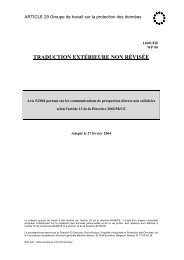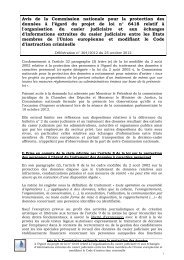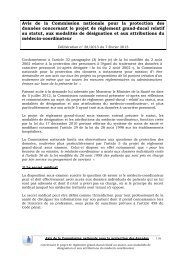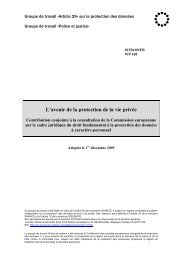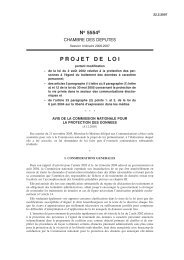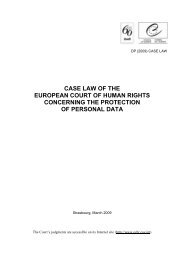case law of the european court of human rights concerning the ...
case law of the european court of human rights concerning the ...
case law of the european court of human rights concerning the ...
Create successful ePaper yourself
Turn your PDF publications into a flip-book with our unique Google optimized e-Paper software.
so-called testicular feminisation, or with XY chromosomes despite <strong>the</strong>ir feminine appearance);<br />
secondly, current research suggested that <strong>the</strong> ingestion <strong>of</strong> certain substances at a given stage <strong>of</strong><br />
pregnancy, or during <strong>the</strong> first few days <strong>of</strong> life, determined transsexual behaviour, and that<br />
transsexualism might result from a chromosome anomaly. There might thus be a physical, not<br />
merely psychological explanation <strong>of</strong> <strong>the</strong> phenomenon, which would mean that <strong>the</strong>re could be no<br />
excuse for refusing to take it into account in <strong>law</strong>.<br />
(b) As regards <strong>the</strong> legal aspects <strong>of</strong> <strong>the</strong> problem, Miss B. relied on <strong>the</strong> dissenting opinion <strong>of</strong> Judge<br />
Martens, annexed to <strong>the</strong> Cossey judgment (Series A no. 184, pp. 35-36, para. 5.5); <strong>the</strong> differences<br />
which still subsisted between <strong>the</strong> member States <strong>of</strong> <strong>the</strong> Council <strong>of</strong> Europe as to <strong>the</strong> attitude to be<br />
adopted towards transsexuals (ibid., p. 16, para. 40) were counterbalanced to an increasing extent by<br />
developments in <strong>the</strong> legislation and <strong>case</strong>-<strong>law</strong> <strong>of</strong> many <strong>of</strong> those States. This was supported by<br />
resolutions and recommendations <strong>of</strong> <strong>the</strong> Assembly <strong>of</strong> <strong>the</strong> Council <strong>of</strong> Europe and <strong>the</strong> European<br />
Parliament.<br />
(c) Finally, <strong>the</strong> applicant stressed <strong>the</strong> rapidity <strong>of</strong> social changes in <strong>the</strong> countries <strong>of</strong> Europe, and <strong>the</strong><br />
diversity <strong>of</strong> cultures represented by those countries which had adapted <strong>the</strong>ir <strong>law</strong>s to <strong>the</strong> situation <strong>of</strong><br />
transsexuals.<br />
47. The Government did not deny that science had in <strong>the</strong> twentieth century, especially in <strong>the</strong> last<br />
three decades, made considerable advances in <strong>the</strong> use <strong>of</strong> sexual hormones and in plastic and<br />
pros<strong>the</strong>tic surgery, and that <strong>the</strong> question <strong>of</strong> sexual identity was still in <strong>the</strong> course <strong>of</strong> evolution from<br />
<strong>the</strong> medical point <strong>of</strong> view. Transsexuals never<strong>the</strong>less kept <strong>the</strong>ir original chromosomal sex; only <strong>the</strong>ir<br />
appearance could be changed. But <strong>the</strong> <strong>law</strong> should fasten on <strong>the</strong> reality. Moreover, operations which<br />
presented certain dangers should not be trivialised.<br />
National <strong>law</strong>s were also evolving and many <strong>of</strong> <strong>the</strong>m had already changed, but <strong>the</strong> new <strong>law</strong>s thus<br />
introduced did not lay down identical solutions.<br />
In short, things were in a state <strong>of</strong> flux, legally, morally and socially.<br />
48. The Court considers that it is undeniable that attitudes have changed, science has progressed and<br />
increasing importance is attached to <strong>the</strong> problem <strong>of</strong> transsexualism.<br />
It notes, however, in <strong>the</strong> light <strong>of</strong> <strong>the</strong> relevant studies carried out and work done by experts in this<br />
field, that <strong>the</strong>re still remains some uncertainty as to <strong>the</strong> essential nature <strong>of</strong> transsexualism and that<br />
<strong>the</strong> legitimacy <strong>of</strong> surgical intervention in such <strong>case</strong>s is sometimes questioned. The legal situations<br />
which result are moreover extremely complex: anatomical, biological, psychological and moral<br />
problems in connection with transsexualism and its definition; consent and o<strong>the</strong>r requirements to be<br />
complied with before any operation; <strong>the</strong> conditions under which a change <strong>of</strong> sexual identity can be<br />
authorised (validity, scientific presuppositions and legal effects <strong>of</strong> recourse to surgery, fitness for<br />
life with <strong>the</strong> new sexual identity); international aspects (place where <strong>the</strong> operation is performed); <strong>the</strong><br />
legal consequences, retrospective or o<strong>the</strong>rwise, <strong>of</strong> such a change (rectification <strong>of</strong> civil status<br />
documents); <strong>the</strong> opportunity to choose a different forename; <strong>the</strong> confidentiality <strong>of</strong> documents and<br />
information mentioning <strong>the</strong> change; effects <strong>of</strong> a family nature (right to marry, fate <strong>of</strong> an existing<br />
marriage, filiation), and so on. On <strong>the</strong>se various points <strong>the</strong>re is as yet no sufficiently broad<br />
consensus between <strong>the</strong> member States <strong>of</strong> <strong>the</strong> Council <strong>of</strong> Europe to persuade <strong>the</strong> Court to reach<br />
opposite conclusions to those in its Rees and Cossey judgments.<br />
2. The differences between <strong>the</strong> French and English systems<br />
49. The applicant argued that <strong>the</strong> lot <strong>of</strong> transsexuals could be seen to be much harder in France than<br />
in England on a number <strong>of</strong> points. The Commission agreed in substance with this opinion.<br />
41



